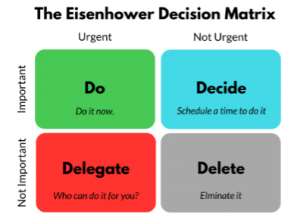When we ask what advice the alumni network would like to see in our monthly articles, help with time management is a popular request. So here are our tips for using your time wisely, whether you’re at work or college.
Set clear short-term and long-term goals
Having a clear long-term goal, such as starting a new career or getting a degree, gives you focus and motivation. However, sometimes having such large, momentous goals can be overwhelming and encourage you to procrastinate. Breaking long-term goals into smaller, manageable short-term goals can help you stay on top of things. For instance, if your long-term goal is to get a degree, you can break this down into short-term goals such as attending all of your lectures, reading three articles per week, completing all of your assignments before you go to bed on Sunday night, and spending half an hour each day revising for your exams.
Make a schedule and stick to it
Routines and habits are important. You don’t have to worry about the small things like exercise, housework, eating, socialising, or arriving for your work or classes on time if they are just part of your routine. This means that your brain has more time to focus on the tasks that require more thought. If you make a schedule and stick to it, eventually over time these behaviours can turn into automatic habits, and you’ll find yourself with much more time to spare than you thought.
Prioritise
If you find yourself faced with an overwhelming to-do list and too little time to do everything on it, prioritisation is a key way to manage your time. Prioritise the most important tasks first, not the most urgent. This is a principle credited to the U.S. President Eisenhower, who used it to organise his workload. He believed that important activities are those which help us achieve our goals, and urgent activities are usually tasks that are associated with someone else’s goals, but they demand attention because not doing them has immediate consequences. Try organising your to-do list into the following categories:
- Urgent AND important – do these first
- Important but NOT urgent – set aside time to do these, and stick to it
- Urgent but NOT important – delegate these tasks as much as possible
- NOT urgent OR important – don’t do them.
This brings us to our next time-saving technique…
Learn to say no
Saying no isn’t always easy, but it is extremely important for time management. It’s the best way to eliminate tasks you don’t want to do, for reducing an overbooked schedule, and for not wasting time on unimportant tasks. Next time someone asks you to complete a task for them, or go for a coffee or Friday night drinks, you could try using the following tips for saying no – and instead use your time to tick some things off your ‘important’ to-do list:
– Avoid over-explaining yourself – just say you don’t have time
– Offer an alternative or a later date
– And don’t feel guilty about keeping your own priorities in mind
Mastering time management techniques are essential for anyone hoping to achieve success, no matter what stage they’re at in their studies or career… if you can put some of these ideas into practise, you’ll be well on your way.

